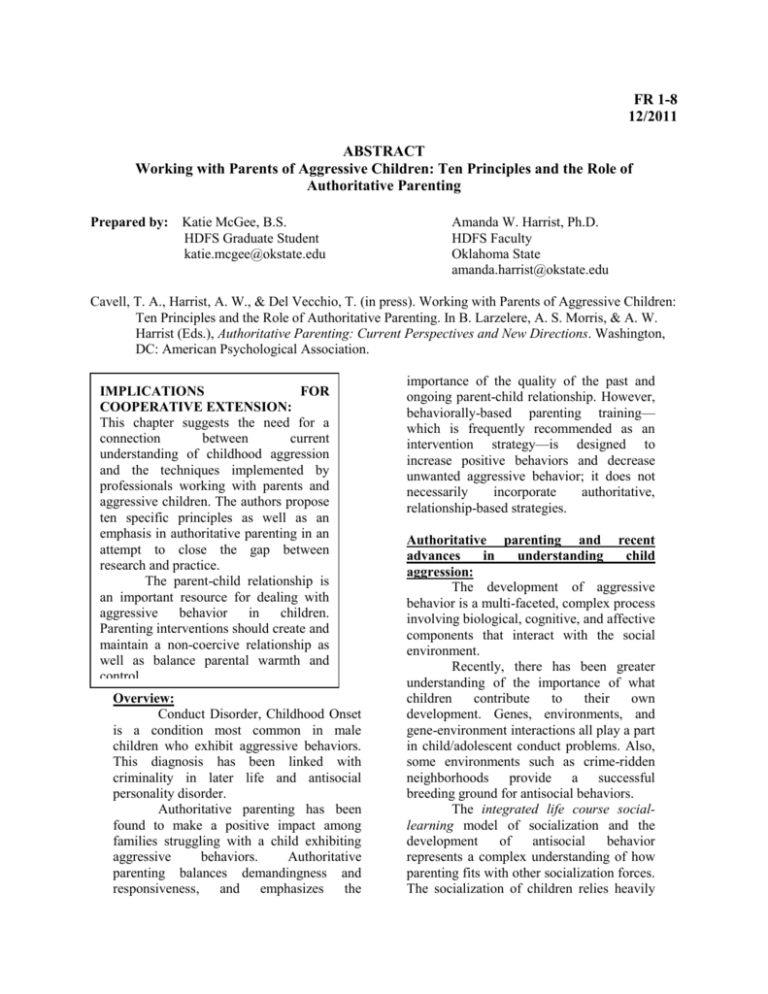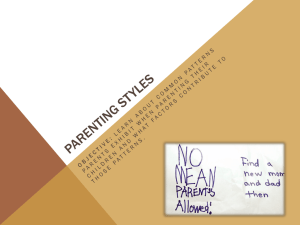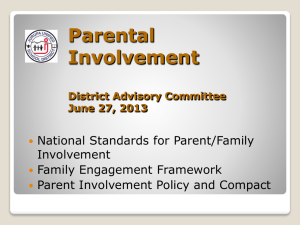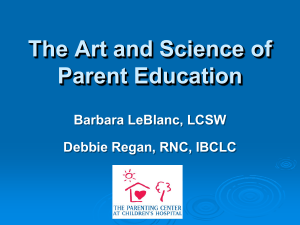FR 1-8 12/2011 ABSTRACT Working with Parents of Aggressive
advertisement

FR 1-8 12/2011 ABSTRACT Working with Parents of Aggressive Children: Ten Principles and the Role of Authoritative Parenting Prepared by: Katie McGee, B.S. HDFS Graduate Student katie.mcgee@okstate.edu Amanda W. Harrist, Ph.D. HDFS Faculty Oklahoma State amanda.harrist@okstate.edu Cavell, T. A., Harrist, A. W., & Del Vecchio, T. (in press). Working with Parents of Aggressive Children: Ten Principles and the Role of Authoritative Parenting. In B. Larzelere, A. S. Morris, & A. W. Harrist (Eds.), Authoritative Parenting: Current Perspectives and New Directions. Washington, DC: American Psychological Association. IMPLICATIONS FOR COOPERATIVE EXTENSION: This chapter suggests the need for a connection between current understanding of childhood aggression and the techniques implemented by professionals working with parents and aggressive children. The authors propose ten specific principles as well as an emphasis in authoritative parenting in an attempt to close the gap between research and practice. The parent-child relationship is an important resource for dealing with aggressive behavior in children. Parenting interventions should create and maintain a non-coercive relationship as well as balance parental warmth and control. Overview: Conduct Disorder, Childhood Onset is a condition most common in male children who exhibit aggressive behaviors. This diagnosis has been linked with criminality in later life and antisocial personality disorder. Authoritative parenting has been found to make a positive impact among families struggling with a child exhibiting aggressive behaviors. Authoritative parenting balances demandingness and responsiveness, and emphasizes the importance of the quality of the past and ongoing parent-child relationship. However, behaviorally-based parenting training— which is frequently recommended as an intervention strategy—is designed to increase positive behaviors and decrease unwanted aggressive behavior; it does not necessarily incorporate authoritative, relationship-based strategies. Authoritative parenting and recent advances in understanding child aggression: The development of aggressive behavior is a multi-faceted, complex process involving biological, cognitive, and affective components that interact with the social environment. Recently, there has been greater understanding of the importance of what children contribute to their own development. Genes, environments, and gene-environment interactions all play a part in child/adolescent conduct problems. Also, some environments such as crime-ridden neighborhoods provide a successful breeding ground for antisocial behaviors. The integrated life course sociallearning model of socialization and the development of antisocial behavior represents a complex understanding of how parenting fits with other socialization forces. The socialization of children relies heavily on the dyadic processes within parent-child relationships. While the parent-child relationship is one of importance, it is but one setting that affects a child’s development. Antisocial children are more likely to be unsuccessful in pro-social peer contexts, for example, and therefore turn to deviant contexts. Monitoring and managing children’s interactions within these contexts is also challenge for parents whose children are engaging in antisocial behaviors. Parent management training: Parent management training (PMT) is a technique for parents to use discipline strategies rooted in behavior to deal with their children’s misbehavior. PMT seeks to first increase positive child behaviors through praise and rewards, and then to decrease undesired behaviors through punishment. PMT is a prominent tool for parenting severely aggressive children. While PMT has been successful, it has not kept up with the developments regarding parenting and its role in children’s aggressive tendencies. The missing piece for parenting an aggressive child is a model that emphasizes long-term management, as the child develops, and a model that appreciates the complexity of the socialization of children. Ten guiding principles for parent-based interventions: These ten principles seek to blend authoritative parenting with what is known about the development of childhood aggression and PMT. Principle 1: The long-term socialization of aggressive children takes precedence over the short-term management of their behavior. Principle 2: The parent-child relationship is a useful vehicle for socializing aggressive children. This principle places an importance on not only managing child behavior, but also how parents respond to the behavior. This principle attaches time to parent-child interactions and recognizes the past and how to approach the future. Principle 3: Socializing relationships provide aggressive children, over time, with emotional acceptance, behavioral containment, and prosocial values. This principle highlights the blending of positive parenting and discipline practices. Principle 4: The ratio of emotional acceptance to behavioral containment is a key parameter of the socializing relationship. The fourth principle recognizes the importance of emotional acceptance. Positive emotional exchanges should exceed negative exchanges in order for the child to learn right from wrong in a emotionally accepting atmosphere. Principle 5: Characteristics of the parent, the child, and the ecology surrounding the parent-child relationship affect the degree to which socializing relationships are established and maintained. This principle encourages parents to not be inconsistent and emotionally reactive towards their children. The complexity of child behaviors, parent characteristics, and context surrounding aggressive children makes it difficult to parent. Principle 6: The primary goal of parent-based interventions for aggressive children is helping parents establish and maintain a parent-child relationship that offers minimal coverage but maximum sustainability of the conditions necessary for socialization. Principle 7: Behavioral containment begins with strict limits on aggressive, antisocial behavior. These should be enforced within a context of acceptance, however. Principle 8: Emotional acceptance begins with an implicit message of belonging. Parents should start with an unspoken message of belonging, which will facilitate children’s willingness to comply and cooperate, as well as build a positive relationship. Principle 9: Prosocial values begin with explicit statements against antisocial behavior. This principle recognizes the need for family norms to endorse prosocial rather than antisocial behavior. Children who are predisposed to antisocial behaviors need clear messages against antisocial behavior. Principle 10: Effective parent-based interventions for aggressive children are multi-systemic. Lastly, this principle highlights the systemic nature of effective parent-based interventions. Positive family structure and parental self-care are important to the success of an aggressive child.








